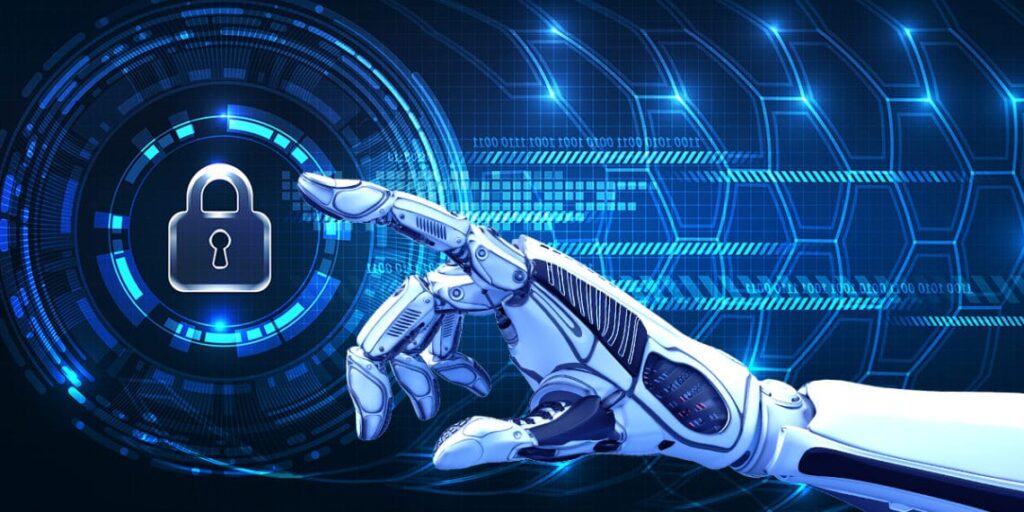Artificial intelligence in cyber security is advantageous because it helps security professionals better understand, study, and evaluate crimes. It improves businesses’ cyber security tools to ward off fraudsters keeping clients and employees secure. The Role of Artificial Intelligence in Cyber Security will go hand-in-hand with every evolving tech advancement, have a look at some of the significant security roles played by AI through this blog.
Technological advancement is thriving in every industry with its outbound digital capacities. But, with great responsibility comes excellent accountability- to make the digital world accountable for cybercriminals, every business is sincerely moving towards cybersecurity. Moreover, advancements like AI & ML can provide apt security to online ventures.
Cybersecurity has traditionally been a resource-intensive field that involves manual monitoring, threat hunting, and incident response. However, the application of AI in cybersecurity has the potential to change that by automating many of these tasks.
What is Artificial Intelligence?
Artificial intelligence is when machines (computers) display intelligence instead of people. In short, machines are adept at doing the activities that make up human intellect.
AI can be categorized into three main applications:
- Assisted Intelligence – This is a basic form of AI that helps with tasks and processes by utilizing large collections of data.
- Augmented Intelligence – A more sophisticated form of AI that enhances human intelligence rather than replacing it. Augmented intelligence can integrate newly acquired data with existing information to create innovative solutions.
- Autonomous Intelligence – The most advanced form of AI that enables systems, computers, and bots to operate independently without any human intervention.
One of the key benefits of artificial intelligence in cybersecurity is its ability to analyze vast amounts of data and detect patterns that may not be visible to humans. AI systems can also continuously monitor networks and endpoints for signs of malicious activity and respond in real-time, reducing the time it takes to detect and respond to threats.
According to a study conducted by Cybint, human error is responsible for around 95% of cybersecurity breaches. This emphasizes the crucial need for securing company networks as phishing attacks were experienced by 88% of organizations in 2019. AI is increasingly being used as an effective tool to reduce the risks associated with cybercrime.
What AI Actually Does to Protect Your Online Venture from Cybercrime?

Artificial intelligence can automate routine cybersecurity tasks, such as patching systems, updating software, and implementing security policies, freeing security professionals to focus on more strategic tasks and improve overall efficiency.
However, it’s important to note that the effectiveness of AI in cybersecurity relies on the quality of data it receives, the algorithms used, and the skills of the team managing it. Additionally, risks are associated with deploying AI, such as the potential for AI systems to make errors or manipulate by attackers, which requires careful planning and implementation.
Artificial Intelligence (AI) can potentially revolutionize cybersecurity by providing new approaches to detecting and preventing cyber threats. Here are some of the key ways in which AI is utilized in cybersecurity:
- Threat Detection: AI can detect and identify cyber threats in real-time. Machine learning algorithms can analyze large amounts of data, learn standard behaviour patterns, and identify deviations that could indicate an attack.
- Vulnerability Assessment: AI can help automatically identify software and systems vulnerabilities by scanning code and configurations to detect potential security issues.
- Malware Detection: AI can identify malware and other malicious software by analyzing their behaviour, characteristics, and signatures. It can also use predictive models to identify new and unknown threats.
- Fraud Detection: AI can help to detect fraudulent activity, such as financial fraud or identity theft, by analyzing patterns of behaviour and transactions.
- Risk Management: AI can help assess an organization’s overall security risks and recommend strategies to mitigate those risks.
- Security Automation: AI can automate security operations, such as incident response, by analyzing and prioritizing alerts and initiating responses based on predefined rules.
While AI has the potential to improve cybersecurity significantly, it is essential to note that AI is not a panacea. Instead, it is just one tool in the arsenal of cybersecurity professionals and should combine with other techniques such as human expertise, best practices, and other security technologies.
Additionally, there is always the risk that attackers can manipulate AI systems to evade detection, so it is essential to monitor and evaluate the effectiveness of AI-based security systems continually.
Improved Outcomes of Integrating AI with Cybersecurity
AI has several applications in enhancing cybersecurity, such as providing organizations with up-to-date information on hardware and software usage, behavior, and performance through IT asset inventory. This data can help identify potential vulnerabilities and improve security measures.
Additionally, AI can automatically assess the effectiveness of security practices and provide suggestions for improvement in company networks. Another benefit of AI is its ability to not only assess systems but also provide explanations to organizational leaders and end-users, which is crucial in obtaining buy-in for cybersecurity measures.
Which Popular Organizations Use AI for Cybersecurity?
Numerous reputable organizations have recognized the immense potential of AI in enhancing cybersecurity and have already integrated it into their systems. For instance:
- Google, an early adopter of AI in cybersecurity, utilizes deep learning to improve security measures and stay abreast of technological changes.
- IBM’s Watson, a widely acclaimed technology, is known for its ability to consolidate knowledge and identify potential security threats.
- Juniper Networks is dedicated to developing autonomous AI to enhance network security and provide a more user-friendly experience.
Apart from the AI blend in the cybersecurity world, there are some other authentic practices for better security.
Best Practices for Cybersecurity
Several cyber security techniques assist in securing your online and combining AI and cyber security solutions to develop a robust web security solution.
- TLS/SSL Protocol

This digital security protocol uses 256-bit encryption algorithms to encrypt the browser-server data exchange and protect it from hackers, among other cyber security methods.
The majority of common browsers support this well-liked protocol. Including HTTPS (hypertext transfer protocol secure) in the URL and a small padlock in the address bar indicates whether a site is safe.
For instance, we advise browsing the many solutions accessible in the cybersecurity market if you’re looking for a premium yet affordable SSL cert to secure your website. For example, Comodo PositiveSSL Certificate, RapidSSl Certificate, and AlphaSSL Certificate are excellent yet reasonably priced alternatives. Some of its advantages include strong encryption and a decent warranty.
- Utilizing a firewall: Creates a line of defense between your web data and cybercriminals.
- Employee training: Assists and keeps the members informed about current security threats and their solutions.
- Utilizing Secure Password Techniques: The web is safer using MFA (multi-factor authentication) and strong passwords.
- Conducting Regular Data Backups: Regular data backups ensure access to information quickly in an emergency.
What are Certain Threats Imposed by Artificial Intelligence use in the Cybersecurity World?
While AI is a useful tool to mitigate potential cybersecurity threats, it can also be utilized by malicious actors to breach systems. For example, data poisoning involves manipulating AI data to deceive program models into making incorrect predictions.
Additionally, generative adversarial networks (GANs) create a mirror AI system that imitates normal traffic patterns, diverts attention from malicious activities, and extracts sensitive information.
Cybercriminals can also manipulate algorithms used by AI to execute incorrect actions, as seen in the cryptocurrency sector where hackers have altered trading algorithms.
Despite its usefulness, it’s important to recognize that AI is not a foolproof solution for cybersecurity. While it can assist cybersecurity professionals in making decisions, AI models are not infallible and require human evaluation to ensure they represent reality accurately. Ultimately, AI can aid in cybersecurity efforts, but it cannot replace human judgment entirely.
On a concluding note!
AI is becoming an essential technology for improving the performance of IT security teams. However, modern cyber threats’ sheer volume and complexity make it difficult for human analysts to keep up. AI-based security solutions can analyze large amounts in real-time and identify patterns and anomalies that indicate a potential threat.
By using AI, security professionals can better understand their attack surface and prioritize their response to potential risks. AI can also help automate routine tasks, freeing security personnel to focus on more complex tasks requiring human intervention. As a result, it can help improve the efficiency and effectiveness of security operations while reducing the likelihood of human error.

